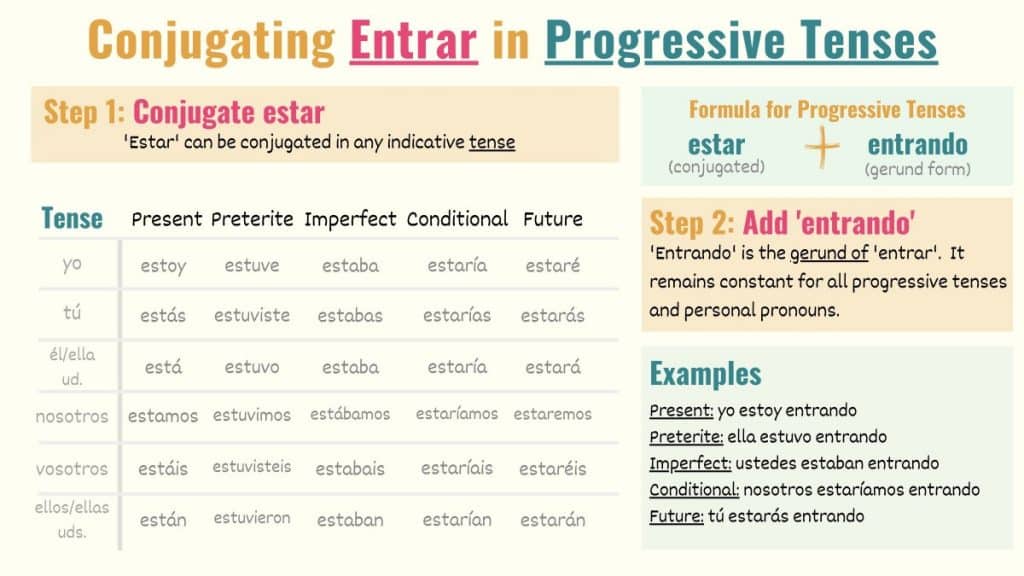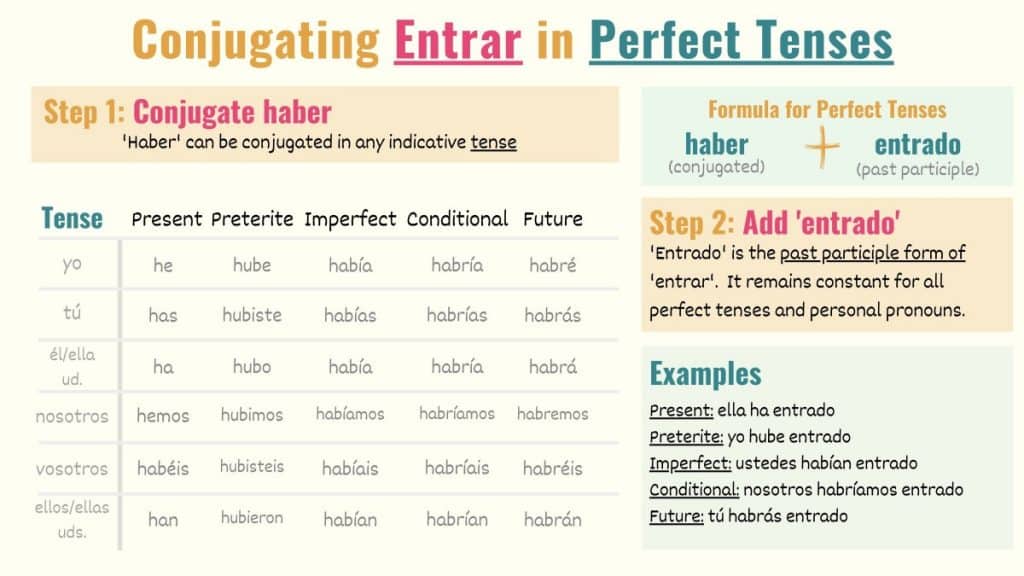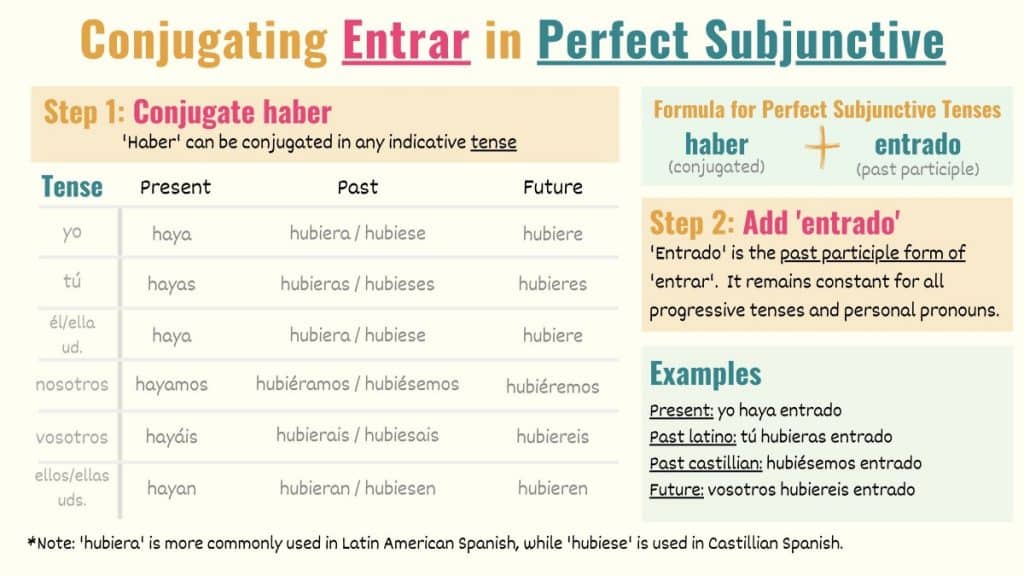In this short guide, we will cover the following topics for ‘entrar’ in Spanish:
- What does ‘entrar’ mean?
- ‘Entrar’ Conjugations
- How to Use ‘Entrar’ in Spanish
- Expressions & Idioms with ‘Entrar’
- Synonyms of ‘Entrar’ in Spanish
What does ‘Entrar’ mean?
Definition – ‘Entrar’ means ‘to go in’, ‘to enter’, ‘to get into’, ‘to join’ or ‘to fit’. It is used to describe that someone or something enters a place or becomes part of a group. In other contexts, it can be used to talk about feelings or to express that a person or object fits into something.
‘Entrar’ will change its meaning depending on which circumstance it is used. Here are some definitions that will help you identify different situations where you can apply this verb.
- When talking about going into a place or situation, it means ‘to enter’, ‘to come in’, ‘to get into’, ‘to get inside’, ‘to be accepted’ or ‘to become part’.
- If talking about fitting into something, ‘entrar’ is translated as ‘to fit’ or ‘to suit’.
- When expressing feelings, it can be used as ‘to have’ or ‘to get’.
‘Entrar’ Conjugations
Being a regular verb in Spanish, to conjugate ‘entrar’, you’ll need to add the corresponding endings for each tense to the stem ‘entr’. Notice that you won’t do this to conjugate to the future and the conditional tenses.
The following tables will show you which endings to add depending on the conjugation and the subject that you’re using.
Indicative
Present tense conjugation
| Person | Conjugation | Translation |
|---|---|---|
| Yo | entro | I enter |
| Tú | entras | You enter |
| Él / Ella / Usted | entra | He/She enters |
| Nosotros | entramos | We enter |
| Vosotros | entráis | You enter |
| Ustedes / Ellos / Ellas | entran | They/You enter |
Preterite tense conjugation
| Person | Conjugation | Translation |
|---|---|---|
| Yo | entré | I entered |
| Tú | entraste | You entered |
| Él / Ella / Usted | entró | He/She entered |
| Nosotros | entramos | We entered |
| Vosotros | entrasteis | You entered |
| Ustedes / Ellos / Ellas | entraron | They/You entered |
Imperfect tense conjugation
| Person | Conjugation | Translation |
|---|---|---|
| Yo | entraba | I entered |
| Tú | entrabas | You entered |
| Él / Ella / Usted | entraba | He/She entered |
| Nosotros | entrábamos | We entered |
| Vosotros | entrabais | You entered |
| Ustedes / Ellos / Ellas | entraban | They/You entered |
Future tense conjugation
Entrar in the future tenses doesn’t require you to use a stem. In fact, you only need to add the future endings to the verb in the infinitive form.
| Person | Conjugation | Translation |
|---|---|---|
| Yo | entraré | I will enter |
| Tú | entrarás | You will enter |
| Él / Ella / Usted | entrará | He/She will enter |
| Nosotros | entraremos | We will enter |
| Vosotros | entraréis | You will enter |
| Ustedes / Ellos / Ellas | entrarán | They/You will enter |
Conditional tense conjugation
To conjugate ‘entrar’ to the conditional tense, you’ll work with the verb as a whole. So, instead of removing the -AR ending, you’ll add the conditional terminations to ‘entrar’.
| Person | Conjugation | Translation |
|---|---|---|
| Yo | entraría | I would enter |
| Tú | entrarías | You would enter |
| Él / Ella / Usted | entraría | He/She would enter |
| Nosotros | entraríamos | We would enter |
| Vosotros | entraríais | You would enter |
| Ustedes / Ellos / Ellas | entrarían | They/You would enter |
Progressive Tenses

Ya estamos entrando al salón, te voy a colgar.
We’re going into the classroom, I’m hanging up.
Perfect Tenses

Luis y yo hemos entrado a la facultad de medicina.
Luis and I have been accepted into Med school.
Entrar Subjunctive Conjugations
Present subjunctive conjugation
| Person | Conjugation | Translation |
|---|---|---|
| Yo | entre | I enter |
| Tú | entres | You enter |
| Él / Ella / Usted | entre | He/She enters |
| Nosotros | entremos | We enter |
| Vosotros | entréis | You enter |
| Ustedes / Ellos / Ellas | entren | They/You enter |
Imperfect subjunctive conjugations
| Person | Conjugation | Translation |
|---|---|---|
| Yo | entrara / entrase | I entered |
| Tú | entraras / entrases | You entered |
| Él / Ella / Usted | entrara / entrase | He/She entered |
| Nosotros | entráramos / entrásemos | We entered |
| Vosotros | entrarais / entraseis | You entered |
| Ustedes / Ellos / Ellas | entraran / entrasen | They/You entered |
Perfect subjunctive

Si no hubiera entrado a la universidad, habría viajado con mi hermano.
If I didn’t get into University, I would’ve traveled with my brother.
Imperative
Imperative conjugation
| Person | Conjugation | Translation |
|---|---|---|
| Tú | entra | Enter |
| Nosotros | entremos | Let’s enter |
| Vosotros | entrad | Enter |
| Ustedes | entren | Enter |
[‘Entrar’ conjugated] + [preposition] + [noun] + complement]
Entren por la ventana, no encuentro la llave.
Enter through the window, I can’t find the key.
Niñas, entren a la casa, por favor.
Girls, go in the house, please.
Keep in mind that to conjugate to the negative imperative, entrar follows the same conjugations that you’d use for the present subjunctive.
No + [‘Entrar’ conjugated] + [preposition] + [noun] + [complement]
No entres a esa habitación, están limpiando.
Don’t go into that room, they are cleaning.
Por favor, no entren al cuarto de su hermano.
Please, don’t go into your brother’s room.
How to Use ‘Entrar’ in Spanish with Examples
There are three main ways in which ‘entrar’ is used in Spanish:
- To say ‘to enter’ or ‘to get into’
- To say that someone or something fits into a place
- To express feelings
Below, I’ve included some descriptions of how to use ‘entrar’ in Spanish. Check the examples provided so you have a better idea of how to apply this verb with its different meanings.
To say ‘to enter’ or ‘to get into’
In Spanish, ‘entrar’ is used to talk about getting inside a place or to explain that someone joined a group or is participating in some kind of event. In this case, ‘entrar’ can be translated as ‘to enter’, ‘to get in’, ‘to get inside’, ‘to be accepted’ or ‘to join’.
[‘Entrar’ conjugated’] + [preposition] + [determiner] + [place or event]
Enrique entró a la habitación a dormir.
Enrique went into the room to sleep.
Karla y yo entramos a la universidad porque aprobamos el examen.
Karla and I got into college because we passed the exam.
Entraremos en actividades artísticas a partir de septiembre.
We will join artistic activities from September onwards.
Describing that someone or something fits into a place
‘Entrar’ can be used to explain that something or someone has the right size to fit into a place or another object. In this case, it can be translated as ‘to fit’ or ‘to suit’.
[Subject] + [‘entrar’ conjugated’] + [preposition] + [place or event]
La maleta no entra en el auto.
The suitcase does not fit in the car.
Mis manos no entran por la ventana.
My hands do not fit through the window.
El perro no entró por la puerta porque era muy pequeña.
The dog did not fit through the door because it was too small.
Take Note: You can also use ‘entrar’ to describe clothing or accessories that don’t fit. If you’re talking about yourself, you’ll need to use reflexive pronouns.
No me entra esta blusa, necesito otra talla.
This blouse doesn’t fit, I need another size.
A Claudia no le entraron los zapatos.
The shoes didn’t fit Claudia.
Expressing feelings
In its pronominal form, ‘entrar’ can help you express that you or another person is starting to have some physical and emotional feelings such as headaches, fear or warmth, etc. In this case, it is translated as ‘to have’, ‘to feel’, or ‘to get’.
Below there is a structure and some examples of this meaning. Notice that you’d need to use indirect object pronouns.
[Indirect object pronoun] + [‘entrar’ conjugated] + [indefinite article] + [feeling]
Me entraba un sentimiento de nostalgia al ver nuestras fotos.
I felt nostalgia when seeing our pictures.
Nos entró un dolor de cabeza cuando salimos de casa.
We got a headache when we left the house.
A tu mamá le entró un dolor de estómago después de comer.
Your mom got a stomach ache after eating.
Take Note: If it’s not clear who you’re referring to or you just want to emphasize your statement, you need to introduce him or her in the sentence. To do this, you’ll use the preposition ‘a’.
De pronto, a Lauren le entraron ganas de llorar.
Suddenly, Lauren felt like crying.
Entrar Expressions & Idioms
In addition to talking about entering a place, entrar is also used in some idiomatic expressions. Learning these phrases not only will allow you to improve your vocabulary but also to practice the conjugations of this verb.
Entrar en contacto: This expression means ‘to come into contact’ or ‘to make contact’. So, it can be used to express that two objects touch each other or to explain that people came into contact and started communicating about something.
Entrar en confianza: This phrase can be used to express that someone has started to feel confident to do something or is starting to get familiar with another person. It can be translated as ‘to start feeling confident’ or ‘to warm up to someone’.
Entrar por la puerta grande: Translated as ‘to enter in triumph’, ‘to enter with your head held high’ or ‘to make a grand entrance’, this expression is used when someone enters a place or starts something in a very worthy way.
Synonyms of ‘Entrar’ in Spanish
Ingresar: This verb can be used when talking about going into a place or being accepted somewhere. It is translated as ‘to enter’, ‘to go in’ or ‘to get into’.
Participar: When talking about being part of an activity or event, we can use ‘participar’ instead of ‘entrar’. This is translated as ‘to participate’.
Pasar: Being the direct translation of ‘to pass’, ‘pasar’ can be used when talking about going inside or across a place. It can also be used when talking about approving a test or a course.
Quedar: In Spanish, ‘quedar’ is the most common way to express that an object (such as clothing or accessories) doesn’t fit a person or another thing. ‘Quedar’ means ‘to fit’ or ‘to suit’.



